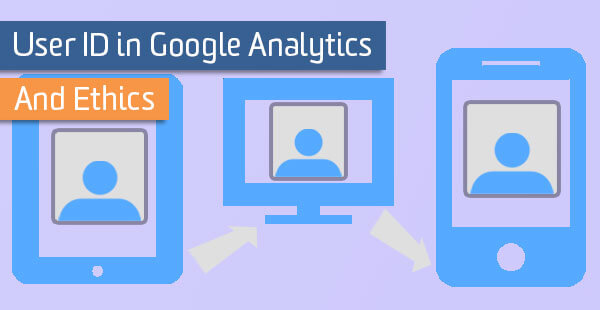User ID In Google Analytics And Ethics

With the release of the latest version of Google Analytics, Universal Analytics, a new feature was rolled out that allows websites to track the same user as they move across different devices and browsers. This feature has great implications for data accuracy – being able to more accurately track users provides companies with better data with which to make to decisions, a clearer picture of the roles that devices play in a customer’s journey, and more ability to advertise to its visitors with appropriate messaging.
Tell me if this scenario has ever happened to you: You look at a product website (shoes, clothing, anything!) on your phone. You later buy that product on a different device, like your home computer, yet on your phone you keep seeing advertisements for the product. But you already purchased it! With User ID, this scenario can be avoided.
On the flip side, some may see the new feature as worrisome, or perhaps even invasive. I’ll try to discuss both sides to the ethics of this new feature!
A Little Background
Before User ID, a user would only be identified with a client ID – a random string of numbers stored in a cookie in a specific browser on a specific computer. This meant that if a user changed devices or browsers, they would appear as two users and two sessions.
Now, with User ID properly enabled, a user who visits a site on their computer, who then returns to the site on their phone where they convert, can be seen as one user, two visits. Because users today are often interacting with businesses on multiple devices, this feature is important in understanding a user’s true path to conversion. If your site has its own authentication or login, then User ID can take you a step further in tracking what your users are doing.
It is important to note that there are restrictions and requirements that must be followed. For example, personally identifiable information cannot be recorded, such as an email address. The unique IDs cannot in any way identify that person. To know more about User ID check out Google’s explanation.
If you want more information on how to implement this, we’ve covered that here.
What Does This Mean for Me?
Now I want to consider User ID and what it means for the general audience, as opposed to how it benefits companies.
It’s weird to think someone is watching, tracking your every move. I can understand how this can be unnerving. (Though in our case, it’s not quite so voyeuristic!)
Since its inception, Google Analytics does track user interactions on your website. How people move through your site, what pages they look at it, do they convert? These are questions that Google Analytics strives to answer.
User ID isn’t meant to add a new look into a user’s personal information, but rather, address the technical limitations of cookie-based web analytics. In fact, even though you are passing in a User ID, that information is used behind-the-scenes to help connect sessions together. There’s not actually a report inside of Google Analytics that shows you the User ID of visitors to your site.
For the most part, people may not understand the complexities of the feature. Many people will agree to the terms of service… perhaps without even reading them. The vast majority of people’s eyes will glaze over when they try to understand third-party tracking, cookies, etc. Do people even really know how much their actions are being tracked? Not only this, but do they know that after signing into a website and agreeing to the terms, a user’s actions just before signing up can be connected using session unification? So actions they took before the User ID was created are attributed to that person. Is this ethical?
What is ‘Ethical’?
The line of what is ethical is tough to draw here. Laws are continually being made or changed and they are different around the world. The word ‘privacy’ doesn’t have a clear definition either and has changed throughout history. Debates about ethics and privacy have occurred after many major inventions, like the printing press, and it is a debate that will continue well into the future. I think the more interesting consideration is not whether it is ethical, but how ethics can change depending on how information is presented.
People can disagree on whether tracking is ethical. But it seems that to have this debate, you need transparency from those employing tracking data. People seem to trust companies that are upfront with what they are doing. What is fascinating is the number of people who don’t care about being tracked … as long as it benefits them.
There isn’t much polling data that I could find, but take Britain’s CCTV surveillance. Do people care about being filmed if they feel it lessens their chance of getting mugged? There are some polls that suggest strong support for this kind of surveillance, particularly if they feel it aids in catching criminals.
This isn’t exactly the same as creating a User ID or tracking people, but it does have to do with user experience. When people perceive that companies are benefiting from consumers without trading anything in return, that’s not OK. Ethics and privacy tend to go out the window when users feel like they’re getting something.
In the case of Google Analytics’ User ID, companies gain a better understanding of how users interact with their site and can, therefore, make information more relevant or make the site easier to navigate.
How do People Determine What is Ethical?
This is a big debate now in the moral world. Read the abstract of this paper.
Haidt basically says that people’s moral judgments are quick and not necessarily rational. It seems that companies would do better to ensure that tracking can be justified in producing useful things for their customers, rather than trying to justify it through abstract principles.
Put it this way: do I care if google is tracking me? Not really. I agreed to use their service. I benefit greatly from it. And I’m willing to make that trade. Do I care if they know my credit score? Not really. I mean, my credit card company knows what I buy, where, and when. Do I think that’s ethical of American Express? Don’t be silly. I know what I signed up for.
People care about benefiting from an interaction. They are more apt to sacrifice something, like privacy, if they know they get a good user experience in return. And like any good deal, both sides should feel that the other is being open and honest. People don’t like getting bait and switched, or swindled.
Best Practices for User ID Implementation
In order to ensure that the implementation of User ID is ethical, make sure to consider these best practices:
- Follow Google’s guidelines. They recommend being upfront with users and that plays a major factor in making this ethical. Users have to know how they are tracked and what is being tracked.
- Safeguard users’ data. Don’t collect any personally identifiable information. It should be impossible to connect data to a specific user.
- Let people know that you’re using Google Analytics. This can be done a number of ways, but make sure it’s visible. You’re not hiding anything!
- Use these new features to provide the best possible experience for your users. They should be benefiting as well!
Conclusion for Now
So as long as someone doesn’t start telling me that 2 + 2 = 5 (no rounded numbers), I’m ok with User ID and can even be excited about how it can make my online experience more enjoyable.





